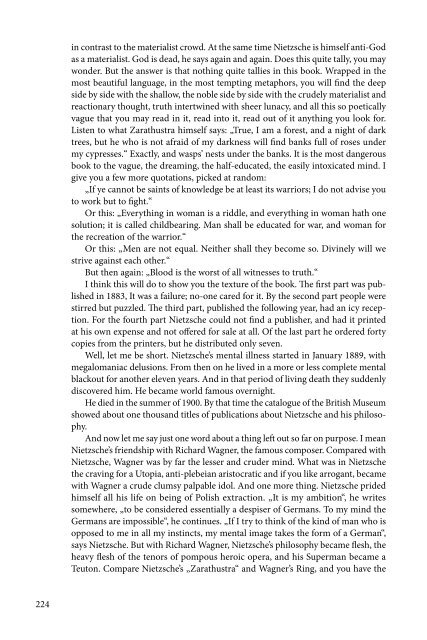- Seite 2:
Franz Stadler (Hrsg.) Robert Neuman
- Seite 5 und 6:
Gedruckt mit der Unterstützung des
- Seite 7 und 8:
Mädchen wohin? Sammelrezension: Vi
- Seite 9 und 10:
Spezis: Gruppe 47 in Berlin (1966)
- Seite 11 und 12:
An Heinrich Neumann, 27.5.1937 479
- Seite 13 und 14:
An B. H. Alexander, Programme Divis
- Seite 15 und 16:
An Lion Feuchtwanger, 11.12.1954 67
- Seite 17 und 18:
Von Helga Koppel, 7.1.1963 764 Von
- Seite 19 und 20:
An Staatsanwalt Erwin Schüle, 22.9
- Seite 22 und 23:
Einladung zu Robert Neumann „Ich
- Seite 24 und 25:
Anfänge und „erste Karriere“ (
- Seite 26 und 27:
Grau ist die Welt und gleich bleibt
- Seite 28 und 29:
Das historische Vorbild, dem er hie
- Seite 30 und 31:
Die Rahmenhandlung schildert den Ve
- Seite 32 und 33:
Macht“ nicht. „Gelegentlich ein
- Seite 34 und 35:
histrionisch, Verwandlungskunst, al
- Seite 36 und 37:
Zurück ins Jahr 1931, zur Urauffü
- Seite 38 und 39:
Völker in den Klauen der Rüstungs
- Seite 40 und 41:
Auslöschung Österreichs erreicht
- Seite 42 und 43:
von Nazis und Deutschen (vgl. ELL,
- Seite 44 und 45:
Abb. 4 Konzept zu „An den Wassern
- Seite 46 und 47:
„Es war eine unruhige Zeit. Seit
- Seite 48 und 49:
Die BRD hat RN um 1951/52 erstmals
- Seite 50 und 51:
„Viele ausgezeichnete Schriftstel
- Seite 52 und 53:
„Poshansk“ ist nicht der erste,
- Seite 54 und 55:
Abb. 7 Mit Gattin Helga (um 1965).
- Seite 56 und 57:
„Daß so viele dieser kompromitti
- Seite 58 und 59:
Im Juni 1959 notiert „Rip van Win
- Seite 60 und 61:
Haus“ eingearbeitet sind. Vorderg
- Seite 62 und 63:
„gibt es eine reichhaltige Palett
- Seite 64 und 65:
Das politische Denken und der intel
- Seite 66 und 67:
Spazierfahrt war, hat die Kumpanei
- Seite 68:
„Robert Neumann bleibt - auch fü
- Seite 71 und 72:
70 Erheblich umfangreicher (aber au
- Seite 73 und 74:
Deutschland und Heinrich Heine (192
- Seite 75 und 76:
Historische Romane und Novellen (19
- Seite 77 und 78:
76 ein feines, reines, menschliches
- Seite 79 und 80:
Oskar Anwands „Das deutsche Morge
- Seite 81 und 82:
historischen Atmosphäre erfüllt.
- Seite 83 und 84:
82 Persönlichkeit, sondern so etwa
- Seite 85 und 86:
84 einer wirklichen Sach-Reportage
- Seite 87 und 88:
Das ist ein Gedicht Nietzsches an G
- Seite 89 und 90:
Oder du, Klauke Dahmskuttel, des Go
- Seite 91 und 92:
Gesamtausgabe“ von 1962, als Vari
- Seite 93 und 94:
Paul Frischauer: Das Herz im Ausver
- Seite 95 und 96:
Gatten, der es industriös mit den
- Seite 97 und 98:
Alexander Lernet-Holenia: Nächtlic
- Seite 99 und 100:
Joachim Ringelnatz: Allerdings. Ged
- Seite 101 und 102:
Und doch, und dennoch: Damit sich d
- Seite 103 und 104:
im Geheimen „gebrochene Herz“ u
- Seite 105 und 106:
Bericht über mich selbst [1929] DV
- Seite 107 und 108:
106 zu sein schien für den dokumen
- Seite 109 und 110:
Gassen ringsum trifft man mit Kinde
- Seite 111 und 112:
110 Samuel Klein und der reckenhaft
- Seite 113 und 114:
Die Meute hinter Remarque (1929/30)
- Seite 115 und 116:
Riß in der Mauer Ihres Baus hinweg
- Seite 117 und 118:
116 schon gewisse Hemmungen gegen G
- Seite 119 und 120:
könne. Deshalb, weil einmal darges
- Seite 121 und 122:
„Weißt Du, man hat mich schon ü
- Seite 123 und 124:
ich ihn ganz naiv zu befragen, wann
- Seite 125 und 126:
Das Ehepaar X. lebt auf ziemlich gr
- Seite 127 und 128:
oder: oder: Zwei Juden begegnen ein
- Seite 129 und 130:
Aus diesem Beispiel erhellt noch kl
- Seite 131 und 132:
Die schönste Situation in meinen B
- Seite 133 und 134:
Mädchen wohin? (1933) Sammelrezens
- Seite 135 und 136:
„Mädchen wohin?“ - das ist so
- Seite 137 und 138:
Biography as a dangerous trade (193
- Seite 139 und 140:
(g) He was asked nine times how muc
- Seite 141 und 142:
Renn, Vicki Baum, Ferdinand Bruckne
- Seite 143 und 144:
142 In seinem Tagebuch notiert RN a
- Seite 145 und 146:
Fünf Minuten am Radio (1941) ED/DV
- Seite 147 und 148:
Frau Sopherl: Drehens ab! (Switch o
- Seite 149 und 150:
Wireless. (Very muffled) … haben
- Seite 151 und 152:
It will, I submit, be a better alte
- Seite 153 und 154:
Schweyk: Gegen Engelland ist er gef
- Seite 155 und 156:
Eine preussische Stimme: Der Nächs
- Seite 157 und 158:
wir Deutschen sind eine von den Naz
- Seite 159 und 160:
[Jules Romains - und der ist unser
- Seite 161 und 162:
160 blind acceptance of Communist c
- Seite 163 und 164:
land. The only comment we today cou
- Seite 165 und 166:
The Story to be told is: The world
- Seite 167 und 168:
interesting a book of this type can
- Seite 169 und 170:
noch - wenn ich auch einmal eine Fr
- Seite 171 und 172:
von der ersten zu der letzten Silbe
- Seite 173 und 174: 172 17.2.1942: „[…] I now learn
- Seite 175 und 176: es nicht mehr hören. Wir haben kei
- Seite 177 und 178: Tokio Calling Nuremberg (1942) Gese
- Seite 179 und 180: Bedeutung haben? Sie haben garkeine
- Seite 181 und 182: 180 Wissen auch S i e es nicht, Fra
- Seite 183 und 184: Das Lied von den SS-Brigaden (1942)
- Seite 185 und 186: Message to Frau Heydrich [1942] DV:
- Seite 187 und 188: An Frau Schmitz aus Koeln [1942] DV
- Seite 189 und 190: Allied Films produced in Britain [1
- Seite 191 und 192: These Are The Men Film-Treatment (b
- Seite 193 und 194: Stuermer, the only paper Hitler rea
- Seite 195 und 196: 27. Want to see the man who runs th
- Seite 197 und 198: Background of Speaker to Austria [1
- Seite 199 und 200: Second Postscript to Austria [1942]
- Seite 201 und 202: 200 im Krieg sind, das macht für D
- Seite 203 und 204: An Austrian to Austrians (3) (1942)
- Seite 205 und 206: Im Nachlass erhalten sind die Konze
- Seite 207 und 208: An Austrian to Austrians (8) (1942)
- Seite 209 und 210: An Austrian to Austrians (10) (1942
- Seite 211 und 212: „Denn es gibt ja in der Geschicht
- Seite 213 und 214: gekommen ist, haben die Nazis ihn g
- Seite 215 und 216: Austrian Brains Trust (Second Insta
- Seite 217 und 218: letzten Sonntag Heu machen gegangen
- Seite 219 und 220: Memorandum [über BBC-Sendungen fü
- Seite 221 und 222: distinction“ wie Duschinsky, Fles
- Seite 223: Stock in sein Haus, der hat von dor
- Seite 227 und 228: Leserbrief in: Zeitspiegel (London)
- Seite 229 und 230: 25 Jahre Republik Österreich - Red
- Seite 231 und 232: 230 Aber was will es besagen? Engli
- Seite 233 und 234: Journal and Memoirs of Henry Herber
- Seite 235 und 236: In kaum einer autobiographischen Ku
- Seite 237 und 238: 236 I said: I am one of them. Gosh,
- Seite 239 und 240: Schlusswort auf dem 27. PEN Interna
- Seite 241 und 242: Von der anderen Seite gesehen (1957
- Seite 243 und 244: Die Protokolle der Weisen von Zion
- Seite 245 und 246: 244 Petljura, den Kosakenhetman in
- Seite 247 und 248: 246 das Gesetz, das ja im Grunde au
- Seite 249 und 250: Inhaltliche Modifikationen weisen d
- Seite 251 und 252: 250 Verlegenheit gebracht. Aber zu
- Seite 253 und 254: hätte. Ich habe gekniffen. Ich sag
- Seite 255 und 256: Fabrik des Schmutzes (1960) ED/DV:
- Seite 257 und 258: Korruption, Soldat gegen Nazi - auf
- Seite 259 und 260: Haben wir nichts gewusst? (1961) ED
- Seite 261 und 262: 19. Juli - Uto erwischte einen im W
- Seite 263 und 264: Der vorliegende Artikel wurde in de
- Seite 265 und 266: 264 Besprechungen des Buches zwei
- Seite 267 und 268: [19 Zeilen „Olympia“] Ein Vergl
- Seite 269 und 270: Ein Skandal, der keiner war. Der Fa
- Seite 271 und 272: nun also ebenfalls beiliegenden „
- Seite 273 und 274: Nichts, ich nahm das aus meinen Bü
- Seite 275 und 276:
8. Ein Münchner Blatt schickt eine
- Seite 277 und 278:
Münchner Blatt - Die besagte Repor
- Seite 279 und 280:
278 Sir John Retcliffe den „Juden
- Seite 281 und 282:
280 Schonauer analysiert also das
- Seite 283 und 284:
282 hat denn auch - Naziopfer hilft
- Seite 285 und 286:
Abschied von Stefan Zweig (1961) ED
- Seite 287 und 288:
Niveau derer standen, die bei Geric
- Seite 289 und 290:
Betrübt macht mich nur Ihre Reserv
- Seite 291 und 292:
290 oder Jahre - ich sage Jahre, de
- Seite 293 und 294:
292 sie sich dazu entschlossen hät
- Seite 295 und 296:
Arnold Zweig zum 75. Geburtstag (19
- Seite 297 und 298:
Die Sorgen und die Macht (1963) Vor
- Seite 299 und 300:
Demgegenüber bekennen sich die im
- Seite 301 und 302:
300 So ergibt sich, wenn ich richti
- Seite 303 und 304:
302 Auch sonst war das, was die dr
- Seite 305 und 306:
Gebiet für jedermanns Phantasie, w
- Seite 307 und 308:
Karl May auf den Index! (1964) ED/D
- Seite 309 und 310:
Antrag 1. daß die Bundesprüfstell
- Seite 311 und 312:
Buch überrollt wird und selbst fas
- Seite 313 und 314:
Offener Brief an Seine Eminenz, den
- Seite 315 und 316:
publizierten Erkenntnisse des Profe
- Seite 317 und 318:
„ - wurde allein in Deutschland v
- Seite 319 und 320:
318 ist als eine wechselseitige lit
- Seite 321 und 322:
• Nichtvorhandene Akteure sind au
- Seite 323 und 324:
Und ich ging selbst mal an die Lahn
- Seite 325 und 326:
Frau Wirtin hatt’ ’nen Corpsstu
- Seite 327 und 328:
a-a-b-b-a bei der englischen, also
- Seite 329 und 330:
Bleibt als abschließende Erwägung
- Seite 331 und 332:
Der häßliche Österreicher. Antwo
- Seite 333 und 334:
Spezis: Gruppe 47 in Berlin (1966)
- Seite 335 und 336:
Wie hieß es doch in Roda Rodas Ele
- Seite 337 und 338:
336 Bezahlern - und den paar AI Cap
- Seite 339 und 340:
338 Zurück zur gekaperten Republik
- Seite 341 und 342:
Meineid gilt dort als Kavaliersdeli
- Seite 343 und 344:
Offener Brief an Roland H. Wiegenst
- Seite 345 und 346:
Konspiration des Schweigens - Ein L
- Seite 347 und 348:
346 Rüstungsvorhaben gebildet word
- Seite 349 und 350:
348 mit denen es jeder zu tun bekom
- Seite 351 und 352:
350 einschließlich der KZ-Häftlin
- Seite 353 und 354:
Die 10 Fragen an Heinrich Lübke Da
- Seite 355 und 356:
354 Nun denke man scharf nach. Jede
- Seite 357 und 358:
persönlich bekannten Verlegern und
- Seite 359 und 360:
358 machen Sie sich nichts daraus,
- Seite 361 und 362:
360 typisch österreichisch, daß d
- Seite 363 und 364:
„Ein Österreicher hat nix, aber
- Seite 365 und 366:
364 selbstironisch verstaubte „Me
- Seite 367 und 368:
mit einer viel breiteren Orchestrat
- Seite 369 und 370:
Dazu: „Es ist an der Zeit, daß i
- Seite 371 und 372:
kritisierte Grass daraufhin umgehen
- Seite 373 und 374:
George Taboris „Die Kannibalen“
- Seite 375 und 376:
374 wird, wenn es den Sozialisten h
- Seite 377 und 378:
Bei „Arischen“: „Anständiger
- Seite 379 und 380:
daß wir eigentlich eine verlorene
- Seite 381 und 382:
380 Um all das genauer zu verfolgen
- Seite 383 und 384:
[Michael oder Soziologie des Tessin
- Seite 385 und 386:
im Haus des aufschneiderischen reic
- Seite 387 und 388:
das Heitere“, zunächst noch beis
- Seite 389 und 390:
388 Soll ich weiter erzählen? Von
- Seite 391 und 392:
Wie viele liebenswerte englische Da
- Seite 393 und 394:
Band POLEMIK (etwa 1972) DV: Hs., u
- Seite 395 und 396:
394 Simmel als Neunzehnjähriger au
- Seite 397 und 398:
396 Nein, halt, so heißt er eben b
- Seite 399 und 400:
398 nachtwandlerisch wenn man will.
- Seite 401 und 402:
Für eine andere Brüderlichkeit (1
- Seite 403 und 404:
402 Das ist der Gedankenbrei, den e
- Seite 405 und 406:
„Ich bekenne mich zu meinem Volk
- Seite 407 und 408:
406 schändliche Vergangenheit wied
- Seite 409 und 410:
Deutsche Autoren im politischen Exi
- Seite 411 und 412:
Walters Darstellung der Bücherverb
- Seite 413 und 414:
Ihr Hörspiel III (Hessischer Rundf
- Seite 415 und 416:
Seit dem Sechstagekrieg „humorvol
- Seite 417 und 418:
416 Der Witz, so der Satiriker und
- Seite 419 und 420:
D Falsch. Das ist eine Lüge! L Da
- Seite 421 und 422:
Von den beiden handschriftlichen Ko
- Seite 423 und 424:
In den Jahren seit 2005/2006 - wäh
- Seite 425 und 426:
Die amtlich-deutschen Namen der Elt
- Seite 427 und 428:
Meldezettel Wien (1915 bis 1937) 21
- Seite 429 und 430:
Von Emil Berté jun. Wien, 21.9.191
- Seite 431 und 432:
Von Drei Masken Verlag Berlin, 30.9
- Seite 433 und 434:
Von K. k. Universitäts-Buchhandlun
- Seite 435 und 436:
An Hermann Hesse [o. O.], 16.7.1923
- Seite 437 und 438:
An Ernst Lissauer [o. O.], 3.9.1926
- Seite 439 und 440:
An Stefan Zweig Wien-Grinzing, 21.5
- Seite 441 und 442:
Von Dr. Thomas Mann München, 7.10.
- Seite 443 und 444:
Von Otto Heller Berlin-Steglitz, 27
- Seite 445 und 446:
An Arthur Schnitzler Wien, 19.6.192
- Seite 447 und 448:
An Arthur Schnitzler Wien, 5.5.1931
- Seite 449 und 450:
An Hermann Kesten [Wien?], 10.12.19
- Seite 451 und 452:
Der linksbürgerliche Philosoph The
- Seite 453 und 454:
452 Ich schrieb ihm, ich hätte von
- Seite 455 und 456:
An Arnold Zweig London, 9.8.1933 Ms
- Seite 457 und 458:
An Julius Bauer London, 27.10.1933
- Seite 459 und 460:
An Zsolnay Verlag [London], [24.4.1
- Seite 461 und 462:
An die Bibliothek zeitgenössischer
- Seite 463 und 464:
An William Rose Buckfast/ S. Devon,
- Seite 465 und 466:
der Folge auch der Übersetzer der
- Seite 467 und 468:
Lassen Sie mich diese Gelegenheit w
- Seite 469 und 470:
An Fritz Kortner Milton Court/Susse
- Seite 471 und 472:
An Frau Itkina o. O., 21.1.1937 Ms.
- Seite 473 und 474:
Aufenthaltserlaubnis (ohne Arbeitse
- Seite 475 und 476:
George Allen & Unwin Ltd. an Silver
- Seite 477 und 478:
An Frank Thiess London, 11.4.1937 H
- Seite 479 und 480:
Der archivierte Brief ist mit „Ab
- Seite 481 und 482:
Von Herbert Reichner Verlag Wien, 4
- Seite 483 und 484:
Von E. S. Stern London, 24.7.1937 H
- Seite 485 und 486:
Sorgen mehr zu machen, das kann ich
- Seite 487 und 488:
An Edwin Muir Great Canfield/Essex,
- Seite 489 und 490:
An Alfred Neumann London, o. J. [ca
- Seite 491 und 492:
An other German Jew who on the stre
- Seite 493 und 494:
An Heinrich Neumann [o. O., Sanary-
- Seite 495 und 496:
Von Emanuel Pilpel New York, 11.5.1
- Seite 497 und 498:
Von J. Engelhorns Nachf. Verlag Stu
- Seite 499 und 500:
Von Franz Werfel Paris, 26.12.1938
- Seite 501 und 502:
An die Österreichische Information
- Seite 503 und 504:
An American Guild for German Cultur
- Seite 505 und 506:
Von Rudolf Olden [Oxford], 11.2.193
- Seite 507 und 508:
An Mr. Borm-Reid London, 22.2.1939
- Seite 509 und 510:
An Josefine Neumann [London, 14.3.1
- Seite 511 und 512:
An Richard A. Bermann Long Crendon/
- Seite 513 und 514:
An Berthold Viertel Long Crendon/Bu
- Seite 515 und 516:
Von Hugo F. Koenigsgarten London, 2
- Seite 517 und 518:
An William Rose Long Crendon/Bucks,
- Seite 519 und 520:
518 wieder ist sie völlig klar und
- Seite 521 und 522:
Von Rudolf Olden [o. O., Oxford], 3
- Seite 523 und 524:
RN sieht die Gründe für die Entsc
- Seite 525 und 526:
An William Rose Long Crendon/Bucks,
- Seite 527 und 528:
Von Heinrich Neumann [London], o. J
- Seite 529 und 530:
An Hermann Broch Long Crendon/Bucks
- Seite 531 und 532:
An Hermon Ould Long Crendon/Bucks,
- Seite 533 und 534:
An Rolly Becker House 14, Mooragh C
- Seite 535 und 536:
ich doch den Fast-Prozeß wegen Roz
- Seite 537 und 538:
eduziert darauf, wie viel man auf e
- Seite 539 und 540:
538 Dem - vielleicht mehr an den Ze
- Seite 541 und 542:
Von Hermon Ould London, 2.1.1941 Ms
- Seite 543 und 544:
542 Ad (c). It shows my point. The
- Seite 545 und 546:
An/von Lore Franziska (Rolly) Neuma
- Seite 547 und 548:
Das erwähnte „Rundschreiben“ i
- Seite 549 und 550:
Unmittelbar nach dem XVII. Kongress
- Seite 551 und 552:
An Arnold Zweig London, 4.2.1942 Ms
- Seite 553 und 554:
552 In dem handgeschriebenen 3-Seit
- Seite 555 und 556:
Von Arnold Zweig Haifa, 10.5.1942 M
- Seite 557 und 558:
An Austrian PEN (Rundschreiben) Lon
- Seite 559 und 560:
Von Francis Gysin Cambridge, 25.5.1
- Seite 561 und 562:
österreichisch-monarchistisches Ge
- Seite 563 und 564:
An Julius Braunthal THE AUSTRIAN P.
- Seite 565 und 566:
das Gedärm aus dem Leib frisst. De
- Seite 567 und 568:
An B. H. Alexander, Programme Divis
- Seite 569 und 570:
An Lion Feuchtwanger London, 20.7.1
- Seite 571 und 572:
der es nicht entrinnen kann, und da
- Seite 573 und 574:
An Heini Neumann [o. O., London], 2
- Seite 575 und 576:
Von Franz Joseph Matuschka Oxford,
- Seite 577 und 578:
Dankt ihr für ihre Hilfe, und für
- Seite 579 und 580:
ein wenig dazugibt, verstärkt, int
- Seite 581 und 582:
An Louis Golding o. O., 4.4.1944 Ms
- Seite 583 und 584:
An Arnold Zweig Ffestiniog/N. Wales
- Seite 585 und 586:
Von Heinz Karpeles London, 6.6.1944
- Seite 587 und 588:
An Franz Werfel London, 25.8.1944 M
- Seite 589 und 590:
An Walter Hollitscher Blaenau Ffest
- Seite 591 und 592:
Von Rolly Neumann [o. O., London],
- Seite 593 und 594:
Von Katherine Webb (Hutchinson & Co
- Seite 595 und 596:
Von Gertrud [Cornelius] [Oxford], 2
- Seite 597 und 598:
Die erste Neugründung einer Schrif
- Seite 599 und 600:
An Arnold Zweig London, 18.12.1945
- Seite 601 und 602:
An Arnold Zweig London, 3.1.1946 Ms
- Seite 603 und 604:
Von Rolly Neumann [London], 6.1.194
- Seite 605 und 606:
„Margaret, Anna“ meint Margaret
- Seite 607 und 608:
606 in seiner Monographie: P.E.N. P
- Seite 609 und 610:
Rollys Vater, Karl Becker, Architek
- Seite 611 und 612:
An Victor Gollancz Harlech/North Wa
- Seite 613 und 614:
Von Victor Gollancz London, 9.7.194
- Seite 615 und 616:
Schriftstellervereinigung; für die
- Seite 617 und 618:
An Johannes R. Becher London, 21.9.
- Seite 619 und 620:
Von Rolly Neumann (London), 1.10.19
- Seite 621 und 622:
An Johannes R. Becher London, 1.11.
- Seite 623 und 624:
der Papst und in der Pariser Bühne
- Seite 625 und 626:
RN hat sich erfolgreich für das Er
- Seite 627 und 628:
Von Dr. Edwin Rollett Wien, 10.4.19
- Seite 629 und 630:
An Arnold Zweig London, 12.4.1947 M
- Seite 631 und 632:
630 seiner „zersetzenden, pazifis
- Seite 633 und 634:
[PEN International-Kongress 1947] D
- Seite 635 und 636:
Von Rolly Neumann Ascona, 26.6.1947
- Seite 637 und 638:
An den Österreichischen PEN Club L
- Seite 639 und 640:
BEZIEHUNGEN ZU FREMDEN BEHÖRDEN. I
- Seite 641 und 642:
Von Thomas Mann Pacific Palisades,
- Seite 643 und 644:
wurde, verdankt er neben dem unerm
- Seite 645 und 646:
644 „1. Besteht wirklich dieser Z
- Seite 647 und 648:
Von Rolly Neumann (o. O.), 1.11.194
- Seite 649 und 650:
Von Thomas Mann [Zürich], Juni 194
- Seite 651 und 652:
Zum Stichwort „innere Emigration
- Seite 653 und 654:
Von Gunter Groll [Verlag Kurt Desch
- Seite 655 und 656:
An Forrest Judd Cranbrook/Kent, 31.
- Seite 657 und 658:
[PEN International-Kongress 1950] A
- Seite 659 und 660:
Neumanns Befürchtung, die neuerlic
- Seite 661 und 662:
Scheidungsklage von Rolly Neumann [
- Seite 663 und 664:
Von Claus Hardt München, 27.5.1952
- Seite 665 und 666:
An Rolly Hauptmann Penrhydeudraeth
- Seite 667 und 668:
An Dr. Wladimir Rosenbaum Cranbrook
- Seite 669 und 670:
An Johannes Tralow Cranbrook/Kent,
- Seite 671 und 672:
Von Jack Bilbo Sanary-sur-Mer, 1.11
- Seite 673 und 674:
Ich freue mich, dass Sie etwas für
- Seite 675 und 676:
Von Rudolf Ullstein Berlin, 31.3.19
- Seite 677 und 678:
An Friedrich Torberg Cranbrook/Kent
- Seite 679 und 680:
Von Evelyn Neumann [Cranbrook/Kent]
- Seite 681 und 682:
An Friedrich Torberg Cranbrook/Kent
- Seite 683 und 684:
Von Kurt Desch München-Obermenzing
- Seite 685 und 686:
Sie mir bitte nicht bös, dass ich
- Seite 687 und 688:
An Hermann Hesse Cavigliano, 26.6.1
- Seite 689 und 690:
An Kurt Desch Brissago, 8.12.1956 M
- Seite 691 und 692:
hätte ich nicht auch in den letzte
- Seite 693 und 694:
Von Stefanie Neumann Wien, 9.2.1957
- Seite 695 und 696:
Allgemeines: Ich hoffe, dass Dr. Mu
- Seite 697 und 698:
An Olga Freundlich München, 7.4.19
- Seite 699 und 700:
Von Johannes Tralow Berlin, 27.4.19
- Seite 701 und 702:
An Hans Josef Mundt (Desch-Verlag)
- Seite 703 und 704:
An Gina Kaus Cranbrook/Kent, 7.7.19
- Seite 705 und 706:
An Max Rychner Cranbrook/Kent, 25.8
- Seite 707 und 708:
An Stefanie Neumann Cranbrook/Kent
- Seite 709 und 710:
An Charlott Frank Cranbrook/Kent, 1
- Seite 711 und 712:
„Onkel Felix“: Fürst Felix Sch
- Seite 713 und 714:
An Charlott und Leonhard Frank Tunb
- Seite 715 und 716:
Von Kurt Desch München, 20.3.1959
- Seite 717 und 718:
An Stefanie Neumann Locarno, 29.4.1
- Seite 719 und 720:
An Ninon Hesse Locarno 21.6.1959 Ms
- Seite 721 und 722:
und mit erheblicher Verzögerung au
- Seite 723 und 724:
722 befreundetes junges Mädchen ü
- Seite 725 und 726:
heiraten? Die Adoptation foppt Niem
- Seite 727 und 728:
Zwecke reiner Dokumentation - begin
- Seite 729 und 730:
An Kurt Ziesel Locarno, 9.6.1960 Ms
- Seite 731 und 732:
An Verlag Kurt Desch Locarno, 10.9.
- Seite 733 und 734:
Kurt Desch an Erika Mann München,
- Seite 735 und 736:
734 zu veröffentlichende Richtigst
- Seite 737 und 738:
Kurt Desch berichtet RN am 7.3.1961
- Seite 739 und 740:
An Friedrich Torberg Locarno, 10.3.
- Seite 741 und 742:
An Golo Mann [o. O.], 30.3.1961 Ms.
- Seite 743 und 744:
742 zustimmend reagiert - mit der B
- Seite 745 und 746:
An Marcel Reich-Ranicki Locarno, 7.
- Seite 747 und 748:
An Marcel Reich-Ranicki Locarno, 10
- Seite 749 und 750:
diskutieren - und ist er kein Narr,
- Seite 751 und 752:
An Wilhelm Steiner Locarno, 22.11.1
- Seite 753 und 754:
dennoch - ich will, besonders in an
- Seite 755 und 756:
Historisch ist, daß Kossuth ungari
- Seite 757 und 758:
An Clifford [Dyment] Locarno, 31.3.
- Seite 759 und 760:
Von Kurt Desch München, 17.10.1962
- Seite 761 und 762:
An Ernst Klett Locarno, 22.10.1962
- Seite 763 und 764:
noch ein Moralist. Inflationstypen
- Seite 765 und 766:
Von Helga Koppel Rom, 7.1.1963 Ms.
- Seite 767 und 768:
Von Kol-Israel, The Israel Broadcas
- Seite 769 und 770:
Staates sind, dem ich dieses Anlieg
- Seite 771 und 772:
An Klaus Piper Locarno, 5.7.1963 Ms
- Seite 773 und 774:
Energie, immens erfolgreich.“ RN
- Seite 775 und 776:
An Manès Sperber Locarno, 19.12.19
- Seite 777 und 778:
An Rolf Linn Locarno, 27.1.1964 Ms.
- Seite 779 und 780:
An Hermann Kesten Locarno, 3.4.1964
- Seite 781 und 782:
Ein sachlicher Brief, wie Du siehst
- Seite 783 und 784:
An Johannes Dieckmann Locarno, 9.6.
- Seite 785 und 786:
Die Hoffnung von RN, für die Proto
- Seite 787 und 788:
An Friedrich-Martin Balzer Locarno,
- Seite 789 und 790:
788 nahm, dass Schimmelmann ein Jud
- Seite 791 und 792:
An Bruno Kreisky Locarno, 7.1.1965
- Seite 793 und 794:
An Jürgen Ensthaler [D.F.U.] Locar
- Seite 795 und 796:
In einem sehr ausführlichen Brief
- Seite 797 und 798:
An Elisabeth Freundlich Locarno, 28
- Seite 799 und 800:
An Alexander von Cube (Vorwärts) L
- Seite 801 und 802:
An Friedrich Karl Kaul Locarno, 7.3
- Seite 803 und 804:
An die Wiener Landesregierung, Magi
- Seite 805 und 806:
15. Beispiel: Ein Grass-Abhängiger
- Seite 807 und 808:
Hermann Kesten zu sprechen, so werd
- Seite 809 und 810:
Von Georg Lukács Budapest, 15.6.19
- Seite 811 und 812:
An Jesco von Puttkamer (Vorwärts)
- Seite 813 und 814:
An Philippe Halsman Gemeindekranken
- Seite 815 und 816:
An Martin Walser Locarno, 23.10.196
- Seite 817 und 818:
An Ulrich Becher Locarno, 27.3.1967
- Seite 819 und 820:
An Carl Zuckmayer Locarno, 24.4.196
- Seite 821 und 822:
An Friedrich Karl Kaul Locarno, 13.
- Seite 823 und 824:
An Ludwig Marcuse Locarno, 27.10.19
- Seite 825 und 826:
Von Friedrich Karl Kaul Berlin/DDR,
- Seite 827 und 828:
An Erich Fried Locarno, 23.1.1968 M
- Seite 829 und 830:
An Elisabeth Freundlich Locarno, 13
- Seite 831 und 832:
An Bundeskanzler Dr. Josef Klaus Lo
- Seite 833 und 834:
An Dr. Erich Bielka Locarno,17.4.19
- Seite 835 und 836:
An Gisela Berglund Locarno, 10.9.19
- Seite 837 und 838:
An Alexander Solschenizyn Schweiz,
- Seite 839 und 840:
Von Erich Bielka Bern, 6.1.1969 Ms.
- Seite 841 und 842:
An Erich Bielka Locarno, 17.1.1969
- Seite 843 und 844:
An Manès Sperber [?], 2.2.1969 Ms.
- Seite 845 und 846:
Von Yisrael Shiloni Naharia (Israel
- Seite 847 und 848:
An Ulrich Becher o. O., 7.4.1969 Ms
- Seite 849 und 850:
so fehlt das böse Lachen des Leser
- Seite 851 und 852:
850 „Sie haben da den falschen Ma
- Seite 853 und 854:
jenen Vierzehnjährigen nicht gehen
- Seite 855 und 856:
An Dieter Lattmann Locarno, 11.1.19
- Seite 857 und 858:
gehörte das Buch zu den seit Krieg
- Seite 859 und 860:
An Gina Kaus Locarno, 6.10.1970 Ms.
- Seite 861 und 862:
An Laszlo Kéry (PEN Magyar) o. O.,
- Seite 863 und 864:
An Ulrich Frank-Planitz, „Christ
- Seite 865 und 866:
An Hilde Spiel Locarno, 2.6.1971 Ms
- Seite 867 und 868:
An Ernest Borneman Locarno, 29.7.19
- Seite 869 und 870:
Von Stefanie Neumann Wien, 21.2.197
- Seite 871 und 872:
An Franziska Becker Locarno, 4.4.19
- Seite 873 und 874:
An Heinrich Böll o. O., 26.6.1972
- Seite 875 und 876:
An Jean Rodolphe von Salis [Locarno
- Seite 877 und 878:
876 Salis resümiert: „Mich, wie
- Seite 879 und 880:
• Schließlich meine Selbstsicht,
- Seite 881 und 882:
daß sie zwar die Anerkennung einer
- Seite 883 und 884:
An Heinrich Böll Locarno, 15.3.197
- Seite 885 und 886:
An Kurt Desch [o. O., Locarno], 29.
- Seite 887 und 888:
An Heinrich Beckschulze [o. O., Loc
- Seite 889 und 890:
An Ulrich Becher Locarno, 14.3.1974
- Seite 891 und 892:
An Walter Fritzsche (R. Piper Verla
- Seite 894 und 895:
Abkürzungen AAK Berlin Archiv der
- Seite 896 und 897:
Robert Neumann: Zeittafel zu Leben
- Seite 898 und 899:
ereits mit der noch verheirateten d
- Seite 900 und 901:
1958 Ende November Übersiedlung in
- Seite 902 und 903:
Literaturverzeichnis A Primärliter
- Seite 904 und 905:
→ Die Puppen von Poshansk. Übers
- Seite 906 und 907:
Synchron oder Man kann auch anders.
- Seite 908 und 909:
Jäger Anne Maximiliane: „Was uns
- Seite 910 und 911:
Wien - London, hin und retour. Das
- Seite 912 und 913:
Bartsch Rudolf Hans - (P) 76 Bauer
- Seite 914 und 915:
Dumas Alexandre - 396 Dürrenmatt F
- Seite 916 und 917:
Hesse Hermann - (P, ELL, VH) 25, 99
- Seite 918 und 919:
Köstler Marie - 41-42, 569-571 Kos
- Seite 920 und 921:
Neumann-Heller Helga - 53, 386, 721
- Seite 922 und 923:
Schalit Leon - 529, 545, 548 Scheck
- Seite 924 und 925:
Wedgwood Veronica - 864 Wehner Herb
- Seite 926:
Scene in Passing/Tibbs - 44-45, 131







